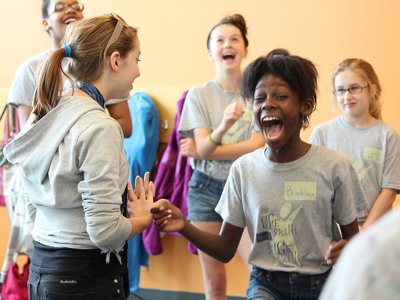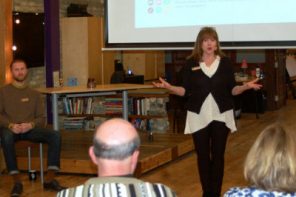There is a glory to the world of theater, with a live audience and a story well-told on a stage shining with light and inhabited by actors who can reach into your soul.
It’s a rare and unique experience, and once you see a great live play, you will never be able to forget it. The experience envelopes you. You can cry, laugh, shrink in fear and stand in joy. Oh, and one other thing.
You can learn.
It’s true for adults and especially true for children.
The top-flight productions at First Stage clearly have the ability that all great plays have to entice, educate and inspire. But this theater doesn’t just stop there. First Stage has a high-level training program in the Theater Academy and a huge outreach program, Theater in Education.
Over 2,000 children took part in the academy last year, and the education program reached over 20,000 students in over 2,000 classroom workshops and residencies. It’s a huge undertaking, but it goes to the core of what First Stage is all about.
“What we do is all about education,” said artistic director Jeff Frank. “Everything we do. We are crafting great art, but it allows opportunities for windows to learning for schools and for parents and families.”
“We talk all the time about how First Stage is so often the first point of contact for young people and their families. And as such, we have a huge responsibility to make sure that those first experiences – whether they happen in a school, an academy classroom, the Todd Wehr Theater or in here – are powerful, transcendent and glorious.”
Education has been a vital part of the First Stage mission since its founding by Rob Goodman 26 years ago.
“Rob set the tone,” Frank said. “He was a theater person, worked at the Rep and all that. He didn’t know anything about children’s theater when he was asked to form one. It was an advantage because he wasn’t bound by anything other people were doing. It was all what he thought was best. And the education component was there from the very beginning.”
One of the important commitments that First Stage makes is the commitment to help train a new generation of actors who will become part of the world of theater in Milwaukee and beyond.
We all know about the outgoing child, changing costumes and performing for parents and relatives. And the training is invaluable to those children.
But there is an incredible value to academy training to all children. A little over a year ago, First Stage began the Next Steps program that focused on young people on the autism spectrum. Students participate in drama and music classes focusing on improvisation, eye contact, scene work, singing and creative movement. There is also an active financial aid program for students who can’t afford the tuition.
Malkia Stampley, who dazzled audiences in the very moving “A Midnight Cry” earlier this year, is the Community Partnership Coordinator for First Stage. She works mainly in the Academy office and works with children, families and schools. She has extensive experience teaching and acting around the country.
“We do not turn anyone away,” she said. “When I first joined the staff, I thought that was insane. How can you make that promise without an enormous budget? Well, we find ways to make it work, and that commitment has been the foundation of my work at First Stage. We don’t turn anyone away and will never give up on a student. Sometimes those who benefit the most from our programming are the ones who need more nurturing, attention or someone to give them a chance.”
“I met with a principal of one of our partner schools going over the list of students we had attending our classes. He was shocked because half of the list were on the ‘no field trip’ list at school, and he was convinced we had magic powers to keep those students engaged. We don’t have magic, just acceptance and that goes a long way. And I try to engage the entire family. The Community Partnership Program offers families in the program tickets to First Stage plays they may not be able to afford, and I host audition workshops and make sure they are aware of any and all opportunities that come across my desk.”
The Theater Academy is also a home for children who aren’t dying to get in front of an audience and sing and dance. Frank is very close to those children.
“That’s my journey,” he said. “I was okay, but I was very shy through third grade. Then I switched schools, and it was hard. Teachers would talk to me, and I would cry. I wasn’t sad; I was just nervous. Theater began to open a new world for me, a place where I could gain self-confidence. It was crucial in my development. It let me open my life and blossom.”
John Maclay, who along with Frank has headed the education efforts of the company, sees an increasing need for the kind of things theater can do.
“We have become so much more detached,” he said. “We plug in the screen, and we find ourselves staying in our house and we work from home. Theater has the ability to connect everyone in the room with their shared humanity. Children can be lonely, and there can be a disconnect about them. We can help create connections for them. This is more important now than ever.”
The educational components of First Stage are high level, pegged to standards and curricula that provide a framework for dramatic examples. This is not a case of some actors showing up, putting on a show and then taking a powder. Learning guides and training for teachers helps perpetuate the lessons being taught.
Every time you see a play at First Stage, it’s easy to be moved by these young people who are cast in important roles. There is a level of discipline and professionalism that is rare among children.
“We have a place for everybody in the academy,” Maclay said. “No one gets made fun of, no cliques and everyone gets to be themselves without fear of reprisal in any form. Our guiding principle in the summer academy is that students are nice to each other. You can walk into a classroom with 160 students of all ages, and they are being nice to each other. It’s amazing.”
Maclay summed up everything that First Stage does with a simple message he learned when he first arrived.
“It’s something that I heard Jeff say just after I got here,” he said. “He said that every time you have an encounter with a young person, you have an impact on them. So always make sure it’s a positive impact. It’s the pervasive philosophy of this company. Make sure those children are better off for having dealt with you.”
To read part one, click here. More information on First Stage can be obtained at firststage.org.


 i evaluate to yes even if there's no image
i evaluate to yes even if there's no image  i evaluate to yes even if there's no image
i evaluate to yes even if there's no image  i evaluate to yes even if there's no image
i evaluate to yes even if there's no image  i evaluate to yes even if there's no image
i evaluate to yes even if there's no image  i evaluate to yes even if there's no image
i evaluate to yes even if there's no image  i evaluate to yes even if there's no image
i evaluate to yes even if there's no image